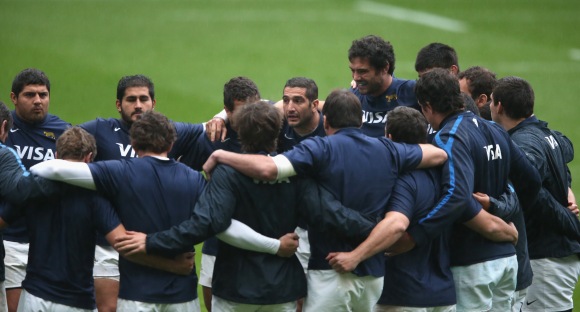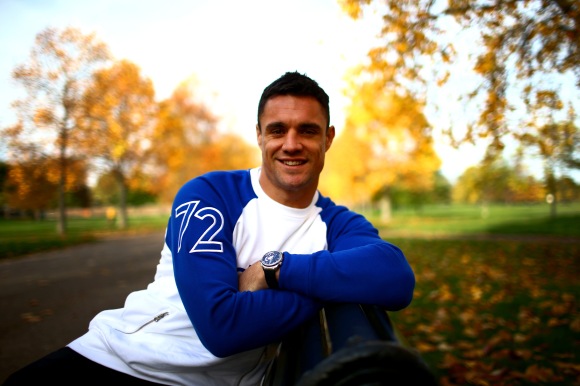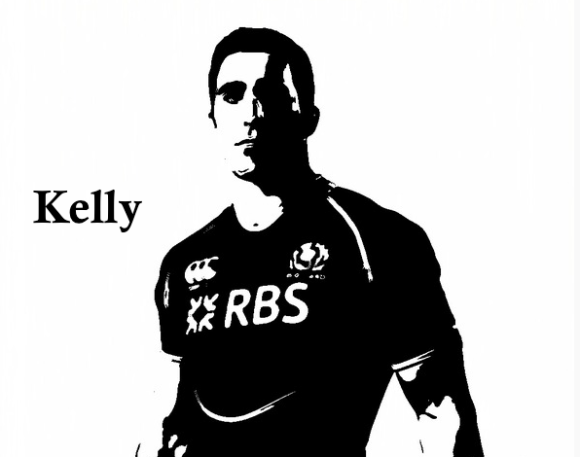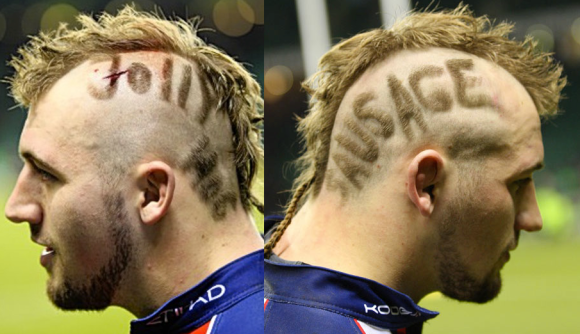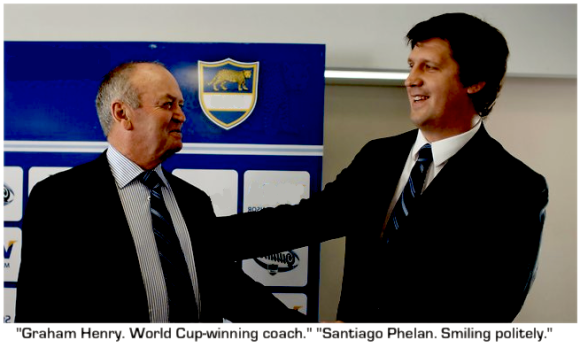There is one word that Paul James’s teammates regularly use to describe the loosehead from Neath: hard. It’s a title that props have always worn with honour, because if there’s one place on the field that demands mental and physical fortitude, it’s in the front row.
That hardness was refined from the moment he left school at 16 and started a vehicle bodybuilding apprenticeship, which meant he would only be able to play youth rugby rather than schoolboy. “I played for Wales Youth, which was basically a harder team,” he says. “Schoolboys were seen as soft; youth boys were harder. A lot harder.”
A man of James’s stature and demeanour was born to graft, and his apprenticeship saw him working on everything from giant arctic lorries to even bigger breakdown trucks. He insists it’s a trade he could still carry out: “You learn how to weld, spray, basic mechanics and electrics, bodywork, everything. They give you the job and you do it from start to finish.”
For James, school was a means to play a good standard of rugby, and Dwr-y-Felin comprehensive in the working-class town of Neath was fit for purpose. Two years above him was future mezzo-soprano superstar Katherine Jenkins, who now regularly sings the Welsh national anthem at the Millennium Stadium. “It’s good to see a Dwr-y-Felin girl doing so well,” says James. “I can’t say I’ve got many of her albums, but she’s an OBE now, so she’s doing alright!”
It might seem a world away from the grand Roman surroundings of Bath, but James isn’t the only former Dwr-y-Felin pupil to have propped up the Blue, Black and White scrum: 19-times capped tighthead Christian Loader played for the Club between 2004 and 2006, meaning there is an extension to that corner of Neath in the heart of Somerset.
At just 17 years old, James signed a professional contract with Neath RFC– with the assurance that he could finish his apprenticeship. The head coach there, Lyn Jones, would play a pivotal figure in his career. As a former amateur player who had juggled the work-rugby lifestyle, Jones appreciated the fact that this young local prop was intent on mastering his trade.
“For about three and a half years it was busy days for me,” explains the 31-year-old. “I’d clock in for work at seven a.m., go training at 10, come back to work at midday, stay until five p.m. and then go training in the nights. I knew rugby would happen for me, but I was a year into the apprenticeship and I wanted to finish it.”
* * *
Professional but not professional. That’s how James remembers his days at Neath, one of Welsh rugby’s most iconic clubs. It’s not hard to read between the lines when he says: “There were a lot of old heads there back in the day, like Gareth Llewellyn and Andrew Millward. You had to have a little bit about you just to be able to hold your own. It was great.”
That the 17-year-old James was not only holding his own in the notoriously unforgiving Neath environment, but finding it “great”, left an indelible imprint on coach Jones’s mind. When regional rugby was born in Wales in 2003, Jones made sure the young prop was part of the Neath-Swansea Ospreys.
“It was an exciting time signing for the Ospreys. In 2003 it was me, Adam Jones and lots of the other Wales U21s boys coming through. Duncan Jones, who was the other loosehead at Neath, was first choice at Ospreys for years. He was a good guy: always there to help and never arrogant or trying to do me over, even though we were both competing for the same shirt.”
There are more romantic ways of gaining your first international cap than facing Romania at Wrexham’s Racecourse Ground, as James did in 2003, so it’s a good thing he isn’t one for putting a gloss on matters. There was to be a six-year gap between his first cap and his second against New Zealand in 2009.
It was Duncan Jones, one half of the “Hair Bear props”, whose injury led to James being called up to the 2003 Rugby World Cup in Australia. He was an unused replacement for the competition, but nonetheless recalls it being “an unbelievable three weeks of enjoying myself”. That enjoyment was followed by two seasons marred by neck injuries and successive operations that left him in the international wilderness before his Welsh career had really begun.
“I thought I’d have to retire and go back to coach-building,” he says of the career-threatening injuries to his neck. “But thankfully that wasn’t the end of my playing days. I missed two seasons and I was out of the Welsh set-up by the time I came back – what with Duncan playing so well – but I’ve been more fortunate in recent seasons.”
* * *
Last season’s Six Nations winners medal would attest to James’s rebirth at international level, coming on the back of some strong performances for Bath, and he is only four tests matches away from equalling the 57 appearances made by Duncan Jones. He always thought he would be a career Osprey, but having spent almost a decade with the Swansea-based region it would appear he was quite happy to leave.
“I’d been there for nearly 10 years, and it was the same every day,” says James. “I was playing alright, but I felt I was going stale. There had been new coaches coming in and out, and it was best for me to move on. Steve Tandy wanted to keep me, but I felt it was best to leave.”
It just so happened that James was on a weekend trip to London in 2012 when his agent rang to say that Bath were interested. “I jumped in the car with my kids and drove here. I listened to the ambitions of the club and was really impressed. My kids were a key factor in the thought process because I’d entertained the notion of moving to France, but the combination of being so close to Wales and Bath being so ambitious sealed the deal.”
His career has intertwined with current teammate Gavin Henson’s – from youth level to Ospreys and now at Bath. James tells the story of how he toiled away for Swansea’s youth team – back then the best youth set-up in Wales – and watched with bemusement as Henson came onto the scene and went straight into the first team.
“You could tell straight away that Gavin was a special talent,” he says. “It’s good to see him showing that here in Bath colours. We’ve got our own little Wales going on here at Bath with big Dom Day and Martin Roberts here as well.”
Many believe James should have started ahead of Gethin Jenkins at Twickenham in this season’s crunch Six Nations match against England. James’s powers at the scrum earlier on could have made a telling impact, but he believes it was other areas of the game that ensured Wales wouldn’t win a record three Championships on the bounce.
“We fronted up a bit more in the England game than we did against Ireland. We got our pants pulled down in Dublin, which was disappointing. At Twickenham, when you have three v ones, and two v ones which are clear try-scoring opportunities you’ve got to take them. So if we’d scored those two tries, even though we were playing badly, we could still have been in the game. We let ourselves down, no doubt about it.”
James shrugs off the question of his disappointment on missing out on last year’s Lions tour as “no dramas – it’s just a part of rugby”. Though he himself hasn’t dwelt on the perceived setback, there were suggestions from those close to the coaching set-up that it wasn’t Warren Gatland who had cut him, but forwards coach Graham Rowntree.
* * *
In international terms, for James it’s all about getting back on track for the upcoming World Cup in England next year, with two of Wales’s pool matches being played at the Millennium Stadium. “You want to be going into that World Cup with more wins under your belt than losses, so that confidence is there. I’m sure the boys will be fine, but there can be frustrating times when everybody supporting Wales expects you to win. When you do lose some people think it’s the end of the world.”
“After we lost to Ireland this year, if you were walking in the street back in Wales you’d think somebody had died. You need perspective.”
At Bath, there is a big push for the final weeks of the season, both in the Aviva Premiership and with the Amlin Challenge Cup Final being played at Cardiff Arms Park on 23rd May. After the explosive scenes at the end of the Gloucester match a few weeks ago, there is no doubting his team’s commitment to the cause.
“There’s a lot of ambition here and the squad is in tune, with a good blend of experience and youngsters,” he believes. “The balance is right. While I’m here I want to achieve some silverware because of all the hard work and sacrifice we put in as a club. You saw how we stuck together and snatched victory from the jaws of defeat at Kingsholm. We’re ready for anything.”












